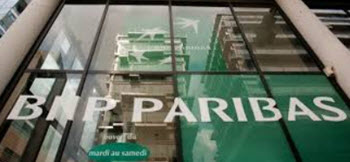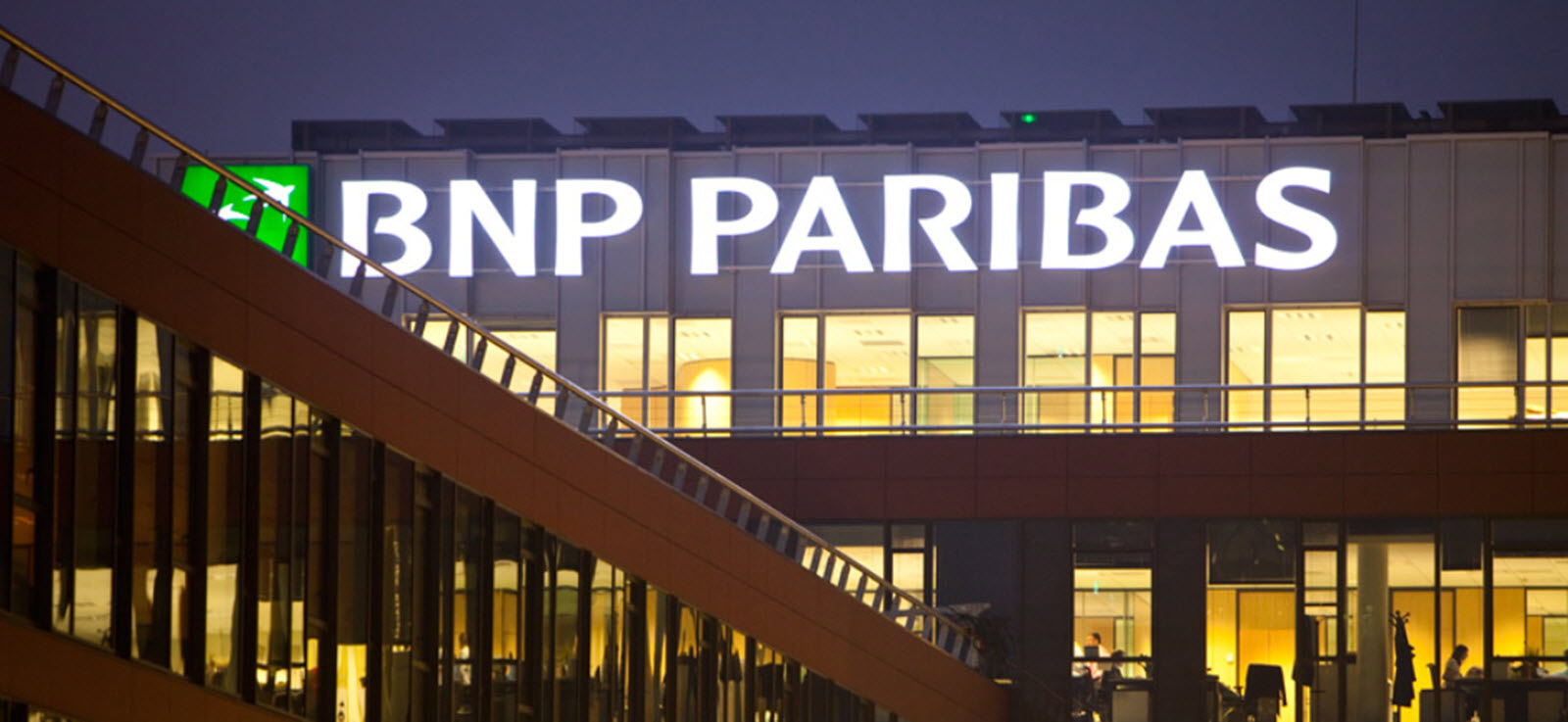BNP Paribas is a French international banking group operating in over 70 different countries spread over five continents. BNP Paribas is the largest bank in the Eurozone by total assets and second largest by market capitalization.
BNP Paribas is listed on the first market of Euronext Paris, where it is traded as BNP. BNP is included in both the French CAC 40 index and the Euro Stoxx 50. BNP Paribas is a very popular stock among day traders. Many brokers offer CFD:s and binary options based on BNP Paribas making it very easy to make leveraged trades. This makes it one of the best stocks for day trading.
 In 2015, the BNP Paribas Group was organized around two business areas:
In 2015, the BNP Paribas Group was organized around two business areas:
- Corporate & Institutional Banking (CIB)
- Retail Banking & Services
On an average day, 250 billions in fixed income instruments are traded at BNP Paribas America’s fixed income trading floor in Manhattan, New York City.
Contents
Background
The roots of BNP Paribas goes back to a national bank founded in 1848. The name was changed to BNP Paribas in the year 2000, as Banque Nationale de Paris (BNP) merged with Paribas.
On the 9th of August 2007, BNP Paribas acknowledged the impact of the sub-prime crisis – the first major financial group to do so. BNP Paribas quickly took steps to protect themselves, and this early reaction – which included the closing of two funds on 9 August – saved it from the harsh losses incured by many other large European banks. Following the 2008 financial crisis, BNP Paribas emerged as one of the worlds five largest banks.
Short facts about BNP Paribas
| Name | BNP Paribas |
| Company type | Société Anonyme |
| Traded as | Euronext: BNP |
| Index inclusion | CAC 40 |
| Industry | Financial services |
| Area served | Worldwide |
| Examples of key products | Consumer banking
Corporate banking Investment banking Asset management Wealth management Credit cards Mortgage loans |
| Founded | BNP in 1848
Paribas in 1872 BNP Paribas in 2000 |
| Headquartered | Boulevard des Italiens, Paris, France |
Corporate & Institutional Banking (CIB)
BNP Paribas’ CIB unit is one of the world’s leading global investment banks, especially in the fields project finance, structured finance and derivatives trading.
The CIB unit has 6 key business areas:
| Area | Info |
| Fixed income |
|
| Equity derivatives |
|
| Commodity derivatives |
|
| Investment banking |
|
| Structured finance |
|
| Corporate & Transaction |
|
Retail banking & Services
Europe is the main focus for BNP Paribas retail banking operations, but this business unit is also present in Turkey, the USA and North Africa.
BNP Paribas is a member of the Global ATM Alliance, which means that its customers can use their ATM cards and check cards at any bank within the alliance without paying ATM surcharges when traveling abroad.
Europe & the Mediterranean Region
 In Europe, BNP Paribas’ most important markets for retail banking are France, Belgium and Italy. In Belgium, uses the bran BNP Paribas (BNP Paribas Fortis), but in Italy it operates as Banca Nazionale del Lavoro (BNL).
In Europe, BNP Paribas’ most important markets for retail banking are France, Belgium and Italy. In Belgium, uses the bran BNP Paribas (BNP Paribas Fortis), but in Italy it operates as Banca Nazionale del Lavoro (BNL).
In France, BNP Paribas runs one of the country’s largest retail banking networks, serving over 6 million households and about 60,000 corporations through approximately 2,200 branches and more than 3,200 ATMs.
Other examples of markets where BNP Paribas offers retail banking are Poland, Ukraine, Turkey, USA, and some countries in Northern Africa.
USA
In the United States, BNP Paribas serves around 5 million clients through its American subsidiary BancWest. BancWest runs Bank of the West in 19 states; all located the western part of mainland U.S. In Hawaii, BancWest operates the First Hawaiian Bank which have a 40% market share in deposits in Hawaii. In the United States, BNP Paribas is especially strong in niche markets such as agribusiness, church lending and lending for marine and recreational vehicles.
In 2015, retail banking represented over 70% of BNP Paribas’ total revenue, making it the company’s largest businesses unit in terms of revenue.
BNP Paribas Investment Partners (IP)
BNP Paribas Investment Partners (IP) offers asset management. In 2014, this unit had approximately 395 billion USD in assets under management, an increase of 11% over 2013.
Examples of legal difficulties
Sanctions violations, falsification of businesses records and conspiracy
In the summer of 2014, BNP Paribas pleaded guilty to falsifying businesses records and conspiracy, having violated U.S. sanctions against Iran, Sudan and Cuba. The company agreed to pay an 8.9 billion USD fine. (To put this sum into perspective, the company’s income for the year 2013 was 6.4 billion USD.) The plea agreement also meant that BNP Paribas agreed to being barred from certain US dollar-dominated transaction for a year.
Failing to adhere to control-tasks imposed by the regulators
In 2017, several major newspapers published an article regarding a €152 million mistrade (erroneous trade), where BNP Paribas Arbitrage has sold securities for €326,400 to the investor Armin S. even though the securities were actually valued at €163 million.
According to the article, the error remained undetected for several days, and BNP Paribas even re-confirmed the price. Eventually, it was unveiled that BNP failed to book any of their trades in structured products in German from 2 to 9 December, 2015. Based on internal documents, The Financial Times estimated that approximately 8500 trades might have been carried out without being booked during this period.
Two main concerns voiced as a result of these findings were:
- Was the bank hedging its positions with unbooked trades?
- Should banks be able to rely on statutory safeguard clauses concerning mistrades in situations where they themselves ignore to carry out the control-tasks imposed by the regulators (in this case, the ECB, BaFin and AMF)?
Unjustified fees for check processing
In 2010, French authorities fined BNP and ten other banks for colluding to charge unjustified fees on check processing. Extra check processing fees had been added during the transition from paper check transfer to electronic transfer (Exchanges Check-Image).
